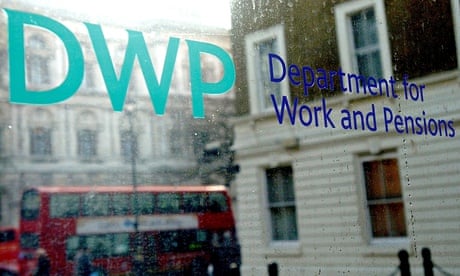The government has drawn up plans to scrap its official jobs website, Universal Jobmatch, after recognising it is too expensive and that its purpose is undermined by fake and repeat job entries, according to leaked internal communications from the Department of Work and Pensions (DWP).
A cache of documents seen by the Guardian details how the government's main website for job hunters – which tens of thousands of unemployed people have been required by the DWP to sign up to – is likely to be jettisoned when the contract for the service comes up for renewal in two years.
A year and a half after its launch, Universal Jobmatch has been ridiculed for hosting numerous fake jobs, including one for an MI6 "target elimination specialist" and "international couriers" for CosaNostra Holdings, as well as listings for pornographic websites.
More recently very serious problems have emerged. Separate investigations by Channel 4 News and the Labour MP Frank Field have uncovered hundreds of thousands of fake, repeat or, in a minority of cases, fraudulent job postings that enticed jobseekers to spend money needlessly – for example on fake criminal records checks – or were a means of harvesting personal information for identity fraud.
At the start of March, the DWP removed more than 120,000, or one-fifth, of all job adverts from over 180 employer accounts, because the ads did not abide by the site's terms and conditions.
Field is now pressing the National Audit Office to investigate the site which he described as "bedevilled with fraud".
The DWP said it regularly monitors Universal Jobmatch to remove jobs that do not meet its rules and that of 524,640 employer accounts only a tiny minority have proven to be in breach of them. The leaked information about Universal Jobmatch became public after the chair of the public accounts committee said last week that the DWP was on the verge of a "meltdown" over its relationship with private companies and welfare reform.
The leaked documents say that some of the website's problems have partly stemmed from the decision by ministers that the site – which is run by the international online recruitment company Monster – be as "open" as possible to all types of employers. Recruitment agencies have taken advantage of this openness by uploading repeat adverts on the site.
The effect, the documents go on to say, has been that civil servants have been unable to determine how many genuine employment vacancies are listed on the site. According to one email, the data simply is not "robust" and rectifying the issue will be expensive.
Other internal communications suggest that civil servants have asked for more than one hundred changes to the service. However senior managers have decided to pass on only a handful of them to Monster because they have given up on improving the current site and expect to start afresh after April 2016.
In light of the high possibility that Universal Jobmatch will be cancelled in its current form, a communique to project heads said that the relationship with Monster now had to be managed "very carefully".
A paper detailing options for overhauling the site includes:
Getting an outside company to create a new service that would "learn the lessons" from Universal Jobmatch.
Designing a site that would only cater for small employers. Jobseekers would be expected to use other sites to find work that was with larger employers.
Coming to some contractual agreement with other major jobs sites to cross-post adverts and merge them into one larger DWP-run database. It is understood that ministers have not been involved in discussions about the new options.
The project to digitise job-searching activity for millions of unemployed people has been beset with problems from its start. The DWP was forced to rerun the bidding process for the contract and previously leaked documents detail how the department had to pay compensation to one of the failed bidders.
The multimillion-pound contract was won by Monster but Iain Duncan Smith's department has been struggling to justify its rapidly rising expenditure. Civil servants say that the US company, which pioneered online recruitment two decades ago, has demanded an extra £975,000 to clear Universal Jobmatch of fraudulent employment ads.
Stephen O'Donnell, who runs the National Online Recruitment Awards, said that Monster was "quite exercised". He said that while the company had made "very good money" on the contract, the DWP was to blame for creating a "real mongrel of a website". "Monster … have real expertise worldwide in building spectacular job boards. They more or less invented the industry. So you do think 'how come it's so bad'? The reason for that is the civil servants basically told Monster 'forget everything you know about job boards, this is what we want'."
O'Donnell said: job centres used to have good checks before the site was launched. It used to be, to put a job in a job centre, a recruitment agency had to call and identify themselves, go through various checks and identify the employer." However without those checks he said many more anonymous postings were being hosted under the DWP's logo. "Anonymous job adverts are terrible. [The job] may or may not exist. It might just be a fishing trip for other information."
" I do not hold Monster at fault: they have been directed by the DWP to do what they are told."
"I think it's criminally unfair to sanction jobseekers for not using such a clumsily built website, rife with spammers … identity thieves and anonymous job ads."
A spokesman for the DWP said that the search for work had become increasingly digital in the last decade and that over the next six months, wifi and 6,000 extra terminals would be installed into jobcentres across the country so jobseekers had access to the latest technology.
Responding to the leak the department said: "Universal Jobmatch revolutionises the way jobseekers find work and ithas already helped many jobseekers find the jobs they want since it was launched in 2012.
"How people find work has become increasingly digital so it's right - and responsible - that DWP should continually look to ensure we are making the best offer to jobseekers.
"The current Universal Jobmatch contract comes to an end in 2016 so any speculation on what will happen after that is premature."
Monster declined to comment.











Comments (…)
Sign in or create your Guardian account to join the discussion